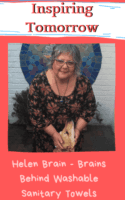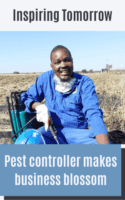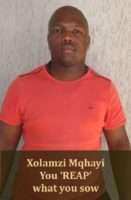Though government declared that sanitary towels will be tax-free, most impoverished women still struggle to have access to these daily necessities. It’s for this reason that Helen Brain came up with the initiative to design washable pads for the underprivileged.
“The washable pads we make go to Mowbray maternity hospital. Some of the women who give birth there are sent straight from the clinic as emergency cases and arrive with nothing. There’s an organisation that gives these women a stork parcel and our pads go into that parcel. The hospital doesn’t give out pads anymore, but this way they get pads to wash and re-use.”
“In addition to Mowbray Maternity hospital, I’ve sewn pads for Lions Club in George, and for Transkei Outreach. I sometimes give to the Little Brinks organisation who distribute them to women in need.”
‘Two hands are better than one’ indeed. More people soon joined Helen and their production flow got even smoother.
“I put out a notice on Facebook saying I was going to be sewing pads that Saturday afternoon and anyone could join me. Twelve people arrived and together we worked out the best way to set up a production line and produce the maximum number of pads in the three hours we had together. People give us old towels, mattress protectors, and flannel sheets which are used for the absorbent cores.”
Helen found the rainbow in her rainy days and turned her misfortunes into opportunities.
“I’ve always loved making things because I have ADD (Attention Deficit Disorder). I find it much easier to work with my hands than to sit still poring over a book. I remember sewing teddy bear clothes at nursery school when I was four, and my mother taught us early to use her sewing machine. She had a big solid old Pfaff machine that sounded like a traction engine. I loved that machine,” she recalls.
One can even dub Helen a ‘jack off all trades’ as she’s also a writer, a mentor and wife.
“I don’t like sitting still, so I’m always doing something with my hands. We watch TV in the evening and I use that time to work on whatever I’m making. At the moment I’m making pouffes and stuffing them with fabric scraps that were destined for landfill. The covers are braided, so I work on those in the evening,” she explains.
She gives her take on the high unemployment rate South Africa is currently facing.
“It is the greatest tragedy of our country – when potential goes undeveloped and untapped. My philosophy is to work with one person at a time, building on their natural talents, and finding ways they can support themselves through a saleable skill. I love developing new products – working on the design, sourcing the materials, improving them until I’m happy and they’re saleable. Then I want to teach someone else to make them, help them find a market, and to move on to designing a new product that someone else can make and sell.”
Helen wraps up with a few words of advice stitched around kindness.
“Create a network of kindness – be kind to yourself, to the people you have contact with, and to the planet.”
***
Tell us: What lesson did you take out from Helen’s story?






